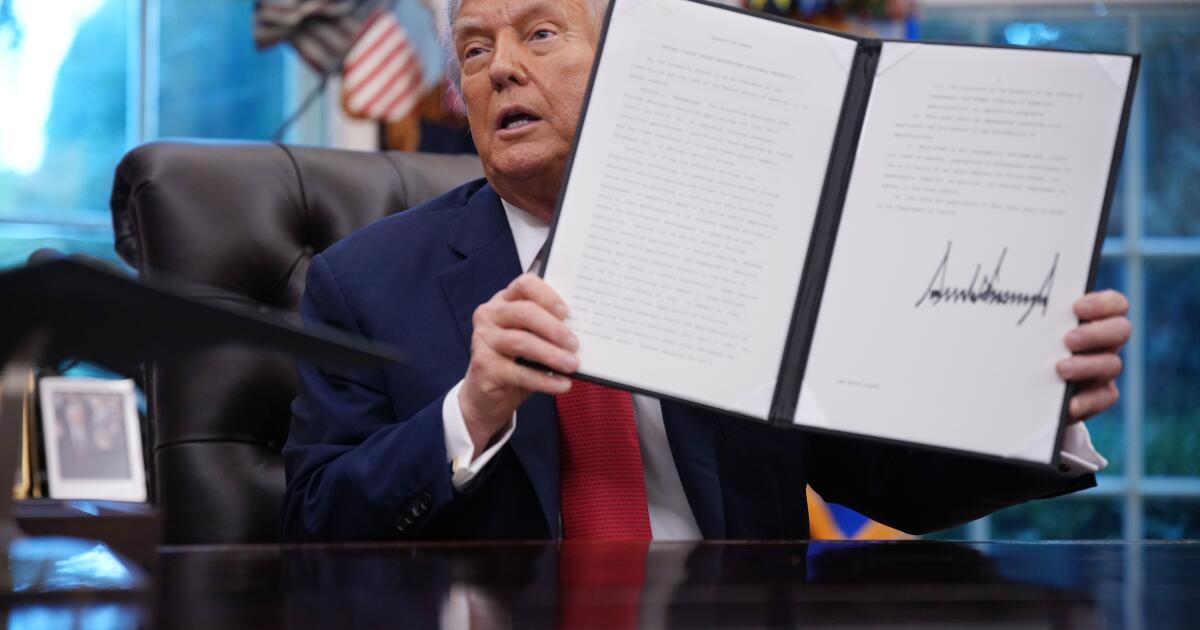Supreme Court rules Trump may remove transgender markers from new passports
WASHINGTON — The Supreme Court has cleared the way for President Trump to remove transgender markers from new passports and to require applicants to designate they were male or female at birth.
By a 6-3 vote, the justices granted another emergency appeal from Trump’s lawyers and put on hold a Boston judge’s order that prevented the president’s new passport policy from taking effect.
“Displaying passport holders’ sex at birth no more offends equal protection principles than displaying their country of birth,” the court said in an unsigned order. “In both cases, the Government is merely attesting to a historical fact without subjecting anyone to differential treatment.”
Justice Ketanji Brown Jackson filed a dissent, joined by Justices Sonia Sotomayor and Elena Kagan.
She said there was no emergency, and the change in the passport policy would pose a danger for transgender travelers.
“The current record demonstrates that transgender people who use gender-incongruent passports are exposed to increased violence, harassment, and discrimination,” she wrote. “Airport checkpoints are stressful and invasive for travelers under typical circumstances—even without the added friction of being forced to present government-issued identification documents that do not reflect one’s identity.
“Thus, by preventing transgender Americans from obtaining gender-congruent passports, the Government is doing more than just making a statement about its belief that transgender identity is ‘false.’ The Passport Policy also invites the probing, and at times humiliating, additional scrutiny these plaintiffs have experienced.”
Upon taking office in January, Trump ordered the military to remove transgender troops from its ranks and told agencies to remove references to “gender identity” or transgender persons from government documents, including passports.
The Supreme Court has put both policies into effect by setting aside orders from judges who temporarily blocked the changes as discriminatory and unconstitutional.
U.S. passports did not have sex markers until the 1970s. For most of time since then, passport holders have had two choices: “M” for male and “F” for female. Beginning in 1992, the State Department allowed applicants to designate a sex marker that differed from their sex at birth.
In 2021, the Biden administration added an “X” marker as an option for transgender and non-binary persons.
Trump sought a return to the earlier era. He issued an executive order on “gender ideology extremism” and said his administration would “recognize two sexes, male and female.” He required “government-issued identification documents, including passports” to “accurately reflect the holder’s sex” assigned at birth.
The ACLU sued on behalf of transgender individuals who would be affected by the new policy. They won a ruling in June from U.S. District Judge Julia Kobick who blocked the new policy from taking effect.
The transgender plaintiffs “seek the same thing millions of Americans take for granted: passports that allow them to travel without fear of misidentification, harassment, or violence,” the ACLU attorneys said in an appeal to Supreme Court last month.
They said the administration’s new policy would undercut the usefulness of passports for identification.
“By classifying people based on sex assigned at birth and exclusively issuing sex markers on passports based on that sex classification, the State Department deprives plaintiffs of a usable identification document and the ability to travel safely…{It} undermines the very purpose of passports as identity documents that officials check against the bearer’s appearance,” they wrote.
But Solicitor Gen. D. John Sauer argued the plaintiffs had no authority over official documents. He said the justices should set aside the judge’s order and allow the new policy to take effect.
“Private citizens cannot force the government to use inaccurate sex designations on identification documents that fail to reflect the person’s biological sex — especially not on identification documents that are government property and an exercise of the President’s constitutional and statutory power to communicate with foreign governments,” he wrote.
